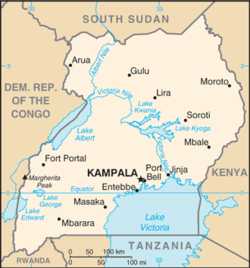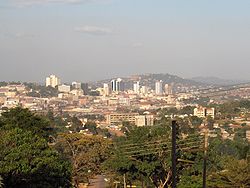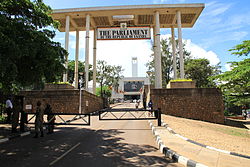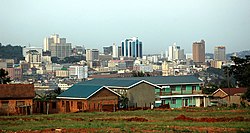This is a list of cities and towns in Uganda: The population data are for 2014, except where otherwise indicated. The references from which the estimated populations are sourced are listed in each article for the cities and towns where the population estimates are given.





Twenty largest cities by population
editThe following population numbers are from the August 2014 national census, as documented in the final report of November 2016, by the Uganda Bureau of Statistics (UBOS).[1]
Cities
editIn May 2019, the Cabinet of Uganda approved the creation of 15 cities, in a phased manner, over the course of the next one to three years, as illustrated in the table below. The 7 of the 15 cities started operations on 1 July 2020 as approved by the Parliament of Uganda.[2]
| Rank | City | Region | Effective Date |
|---|---|---|---|
| 1 | Kampala | Central | 9 October 1962 |
| 2 | Fort Portal | Western | 1 July 2020 |
| 3 | Arua | Northern | 1 July 2020 |
| 4 | Gulu | Northern | 1 July 2020 |
| 5 | Jinja | Eastern | 1 July 2020 |
| 6 | Mbarara | Western | 1 July 2020 |
| 7 | Mbale | Eastern | 1 July 2020 |
| 8 | Masaka | Central | 1 July 2020 |
| 9 | Hoima | Western | 1 July 2020 |
| 10 | Entebbe | Central | 1 July 2022 |
| 11 | Lira | Northern | 1 July 2020 |
| 12 | Kabale | Western | 1 July 2023 |
| 13 | Moroto | Northern | 1 July 2023 |
| 14 | Nakasongola | Central | 1 July 2023 |
| 15 | Wakiso | Central | 1 July 2023 |
| 16 | Soroti | Eastern | 1 July 2020 |
Municipalities
edit- Abim - 17,400
- Adjumani - 43,022
- Alebtong - 15,100
- Amolatar - 14,800
- Amuria - 5,400
- Amuru
- Apac - 14,503
- Arua - 62,657
- Bombo - 26,370
- Budaka - 23,834
- Bugembe - 41,323
- Bugiri - 29,013
- Buikwe - 16,633
- Bukedea - 13,900
- Bukomansimbi - 9,900 (2012)
- Bukungu - 19,033 (2013)
- Buliisa - 28,100
- Bundibugyo - 21,600
- Busembatya - 15,700
- Bushenyi - 41,063
- Busia - 55,958
- Busolwe - 16.730
- Butaleja - 19,519
- Buwenge - 22,074
- Buyende - 23,039
- Dokolo - 19,810
- Elegu - 5,000 (2012)
- Entebbe - 69,958
- Fort Portal - 54,275
- Gombe, Butambala - 15,196
- Gulu - 152,276
- Hima - 29,700
- Hoima - 100,625
- Ibanda - 31,316
- Iganga - 53,870
- Isingiro - 29,721
- Jinja - 72,931
- Kaabong - 23,900
- Kabale - 49,667
- Kaberamaido - 3,400
- Kabuyanda - 16,325
- Kabwohe - 20,300
- Kagadi - 22,813
- Kakinga - 22,151
- Kakira - 32,819
- Kakiri - 19,449
- Kalangala - 5,200
- Kaliro - 16,796
- Kalisizo - 32,700
- Kalongo - 15,000
- Kalungu
- Kampala - 1,659,600
- Kamuli - 17,725
- Kamwenge - 19,240
- Kanoni
- Kanungu - 15,138
- Kapchorwa - 12,900
- Kasese - 101,679
- Katakwi - 8,400
- Kayunga - 26,588
- Kibaale - 7,600
- Kibingo - 15,918
- Kiboga - 19,591
- Kihiihi - 20,349
- Kira - 313,761
- Kiruhura - 14,300 (2012)
- Kiryandongo - 31,610
- Kisoro - 17,561
- Kitgum - 44,604
- Koboko - 37,825
- Kotido - 22,900
- Kumi - 36,493[3]
- Kyazanga - 15,531
- Kyegegwa - 18,729
- Kyenjojo - 23,467
- Kyotera - 9,000
- Lira - 99,059
- Lugazi - 39,483
- Lukaya - 24,250
- Luweero - 42,734
- Lwakhakha - 10,700
- Lwengo - 15,527
- Lyantonde - 8,900
- Malaba - 18,228
- Manafwa - 15,800
- Masaka - 103,829
- Masindi - 94,622
- Masindi Port - 10,400 (2009)
- Masulita - 14,762
- Matugga - 15,000 (2010)
- Mayuge - 17,151
- Mbale - 92,863
- Mbarara - 195,013
- Mitooma
- Mityana - 48,002
- Moroto - 14,818
- Moyo - 23,700
- Mpigi - 44,274
- Mpondwe - 51,018
- Mubende - 46,921
- Mukono - 161,996
- Mutukula - 15,000 (2009)
- Nagongera - 11,800
- Nakaseke - 8,600
- Nakapiripirit - 2,800
- Nakasongola - 7,800
- Namayingo - 15,741
- Namayumba - 15,205[4]
- Namutumba - 18,736
- Nansana - 144,441
- Nebbi - 34,975
- Ngora - 15,086
- Njeru - 159,549
- Nkokonjeru - 14,000
- Ntungamo - 18,854
- Oyam - 14,500
- Pader - 14,080
- Paidha - 33,426
- Pakwach - 22,360
- Pallisa - 32,681
- Rakai - 7,000
- Rukungiri - 36,509
- Rwimi - 16,256
- Sanga - 5,200 (2012)
- Sembabule - 4,800
- Sironko - 18,884
- Soroti - 49,452
- Ssabagabo - 282,664
- Tororo - 41,906
- Wakiso - 60,911
- Wobulenzi - 27,027
- Yumbe - 35,606
References
edit- ^ UBOS (November 2016). "Population of the 20 Largest Urban Centres, 1991 – 2014" (PDF). Kampala: Uganda Bureau of Statistics (UBOS). Archived from the original (PDF) on 12 October 2017. Retrieved 15 October 2017.
- ^ Draku, Franklin (22 May 2019). "Cabinet Elevates 15 Municipalities To Cities". Daily Monitor. Kampala. Retrieved 23 May 2019.
- ^ Uganda Bureau of Statistics (April 2017). "National Population and Housing Census 2014: Area Specific Profiles: Kumi District" (PDF). Kampala: Uganda Bureau of Statistics. p. 29. Retrieved 18 October 2018.
- ^ UBOS (November 2014). "National Population and Housing Census 2014: Provisional Results: Appendix 3 - Households and Population by Subcounty/ Town Council/Urban Division and Sex, 2014" (PDF). Kampala: Uganda Bureau of Statistics (UBOS). Archived from the original (PDF) on 10 January 2017. Retrieved 4 August 2017.
External links
edit